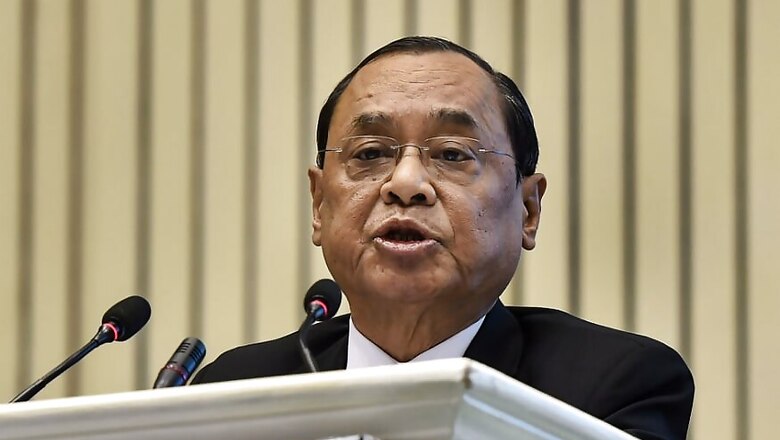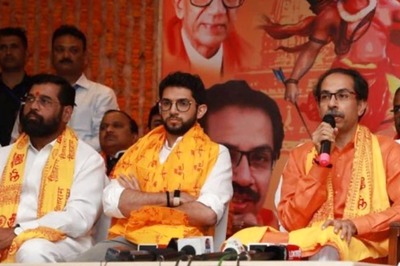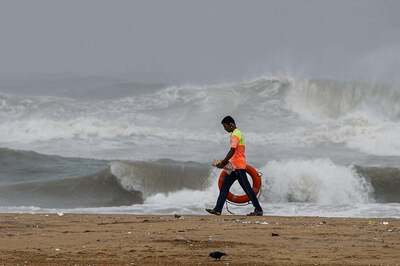
views
New Delhi: Why is that whenever there is no political overtone to a case the Central Bureau of Investigation (CBI) does a good job, asked Chief Justice of India Ranjan Gogoi at a lecture organised by the agency on Tuesday.
Delivering the 18th edition of the DP Kohli Memorial lecture, organised after a gap of two years, Gogoi minced no words in pointing out the flaws and strengths of the agency and offered advice for the way forward.
"True, in a number of high-profile and politically sensitive cases, the agency has not been able to meet the standards of judicial scrutiny. Equally true it is that such lapses may not have happened infrequently," he said, adding that political ramification will affect the quality of investigation.
Such instances reflect systemic issues and indicate a deep mismatch between institutional aspirations, organisational design, working culture, and governing politics, he said.
"Why is that whenever there are no political overtones to the case, the CBI does a good job. A reverse situation led to the celebrated case of Vineet Narain vs the Union of India, wherein the Supreme Court, expressing concern at the state of affairs, laid down explicit guidelines for protecting the integrity of the force," he said.
The legal mandate of the CBI must be strengthened by having a comprehensive legislation addressing deficiencies relating to organisational structure, charter of functions, limits of power, superintendence, and oversight, Gogoi said.
Listing out "imminent concerns" before the agency, he said superintendence and control of the agency continues to, in large measure, lie with the executive by virtue of Section 4 of the Delhi Special Police Establishment Act 1946, the "possibility of it being used as a political instrument" remains ever present. "I have no doubt that there is more than enough strength within the organisation to deal with any such situation," he said.
He said many recommendations of the judiciary to reform the functioning of the Central Bureau of Investigation (CBI) have been accepted as it is by the central government.
"However, given the entrenched afflictions, the current challenge is to ascertain how to make the CBI functional as an efficient and impartial investigative agency fully motivated and guided by the objectives of service to the public at large, upholding the constitutional rights and liberty of the people, and capable of performing in increasingly complex time," he said.
The CJI categorised the "crucial concerns" regarding the CBI in five heads -- Legal ambiguity, weak human resources, lack of adequate investment, accountability and political and administrative interference.
Underlining legal ambiguities in the functioning of the CBI, the CJI said in order to conduct investigation into a state, consent of the concerned state is crucial.
"Given vested interests or bureaucratic lethargy, such consent is often either denied or delayed, severely compromising the investigation," he said. Gogoi said a patchwork of legislations governing the functioning of the CBI adversely affects inter-institutional coordination, both horizontally and vertically.
"The result of multiplicity of institutions results is an aggressive competition for scarce resources and inter-institutional 'turf-war'," he said.
"Further, to address an increasing incidence of interstate crimes, an argument could be made for including 'public order' in concurrent list, for the limited purposes of investigating such crimes.
He, however, cautioned that autonomy without accountability would endanger the very objectives that animated the formation of the institution. "Increased autonomy must be accompanied by enhanced accountability. Such accountability must be both internal and external," he said.
Gogoi expressed concern at the existing gap in the CBI, saying that 15% of the executive posts in the probe agency are vacant, there's a 28% vacancy in technical units and the figure is 50% in its legal department. This leads to overburden of work, he added, saying an inadequate investment in the CBI affects investigation.
(With inputs from PTI)




















Comments
0 comment